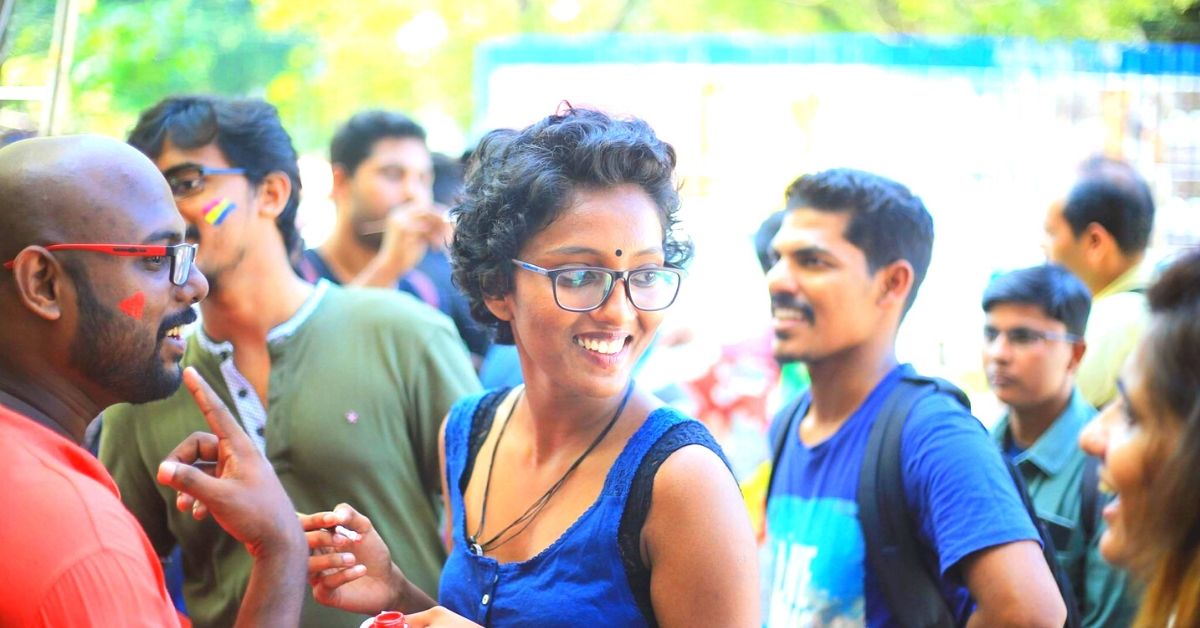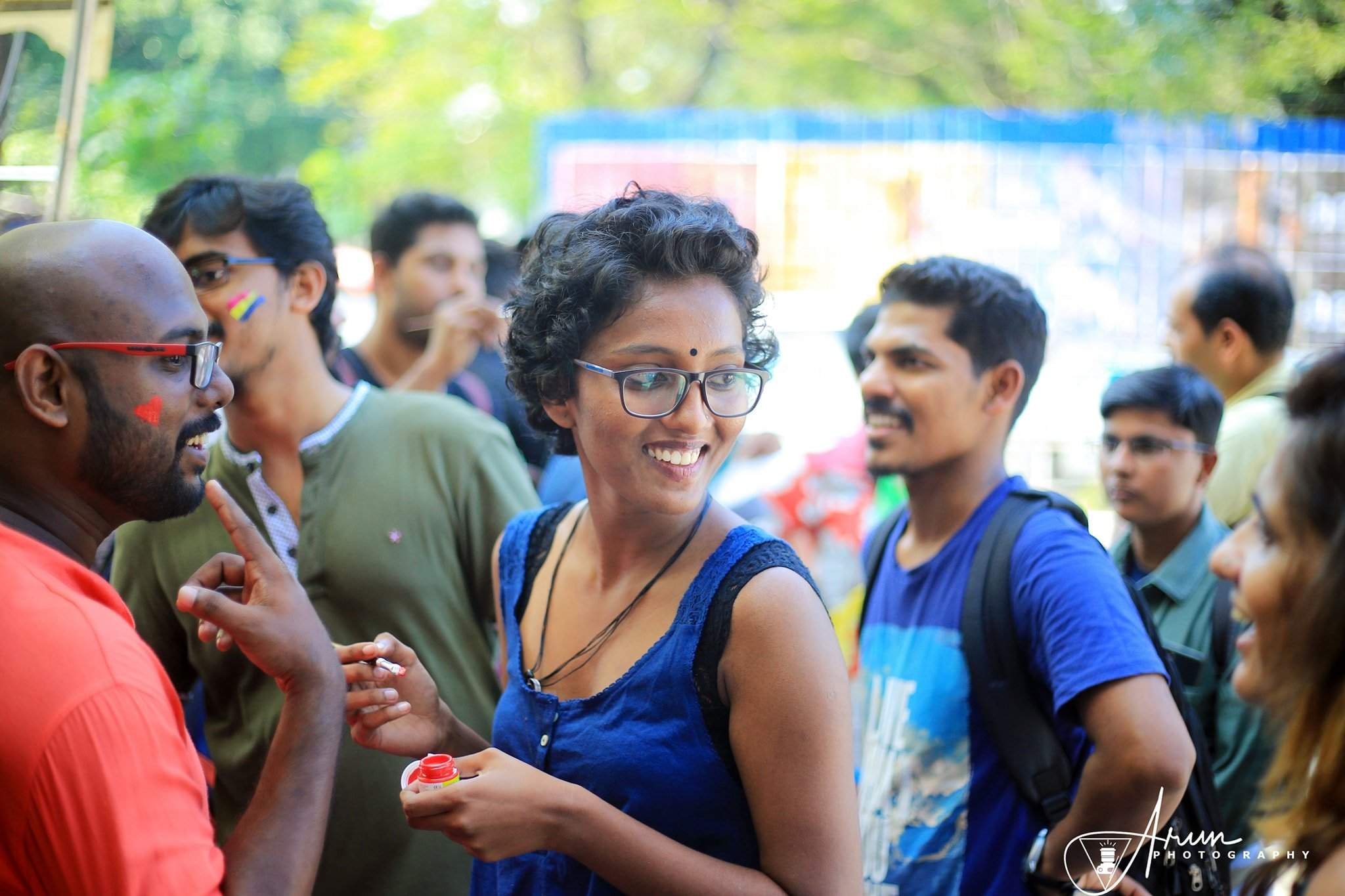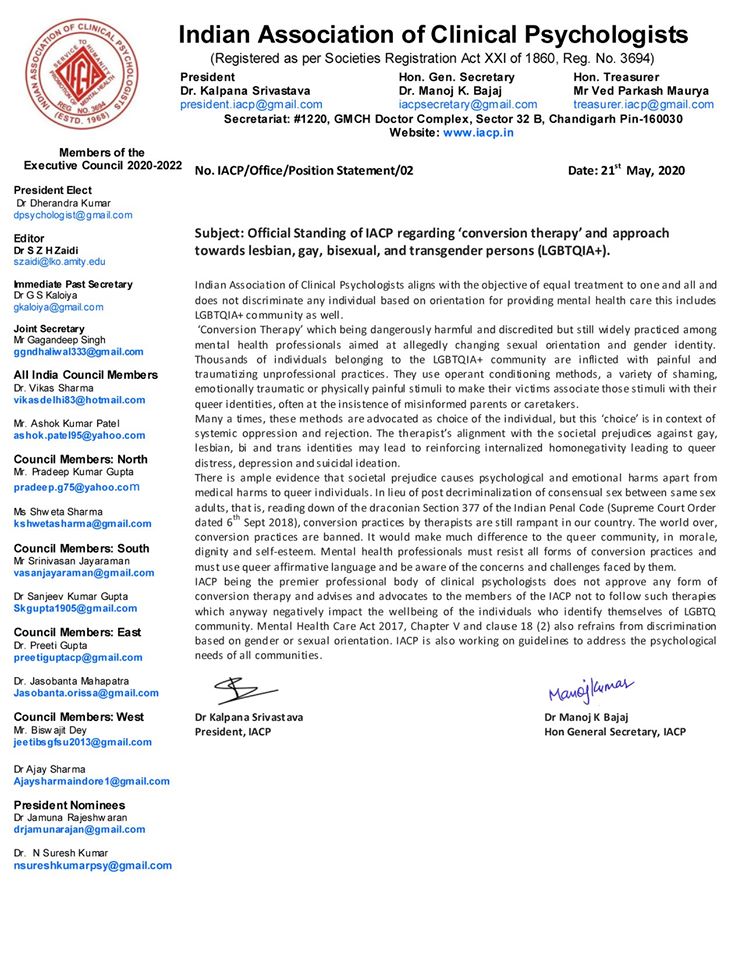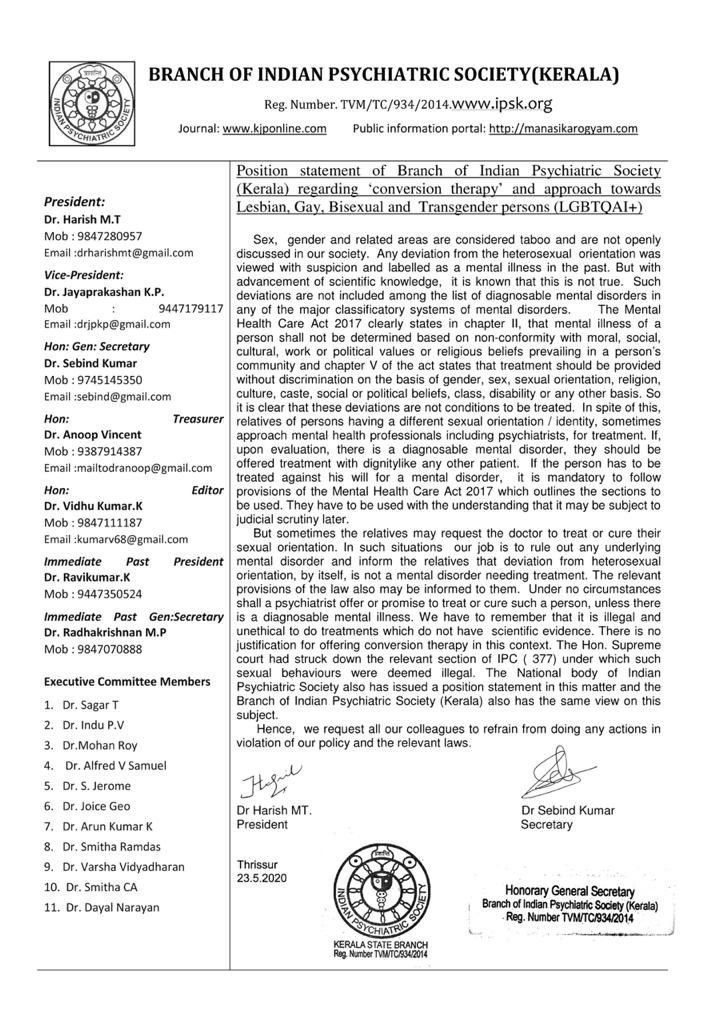Anjana Harish’s Suicide Shows Why India Must End Practice of ‘Conversion Therapy’
"A law seeking a ban on conversion therapy might help, but even if there doesn't exist one there are enough provisions in the law to criminalise it."

With The Positive Collective, The Better India’s COVID-19 coverage is available to regional language publications for free. Write to [email protected] for more details.
On 13 March 2020, a few days before the lockdown began, Anjana Harish, a 21-year-old college student, uploaded a heartbreaking Facebook video where she recounted the horrors she had lived through since late December 2019, after informing her family that she was bisexual.
From sending her to Coimbatore, where doctors forcibly put her under sedatives and even hit her on the head with an implement, to a ‘de-addiction and mental health centre’ in Palakkad, where she was surrounded by ‘hallucinating schizophrenics,’ her family allegedly left no stone unturned to subject her to ‘conversion therapy’—a violent, inhuman, and pseudo-scientific attempt to ‘cure’ or ‘change’ people’s sexual orientation to the heteronormative norm.
“Here, for three weeks, I was physically and mentally kept in a cell. They only brought me out during meal times. I spent every night there crying my heart out alone with only strangers around me. After three weeks, they took me to a place called Karunasai in Trivandrum, which is a similar de-addiction and a mental health centre. I was given some 40 injections in this period, not to speak of the medicines. I was mentally and physically broken,” she recalled in the video.
By March, the Kasargod native had left for Goa with her friends for a change of scene. Once again, she claims her family began threatening her friends. Her parents even filed a missing person’s complaint, following which Anjana and her friends were summoned to the local police station.
On 12 May, she committed suicide, according to the Goa police.

The Horrors of Conversion Therapy
Outlawed in Switzerland, Germany, and parts of Australia, Canada, and the United States, the practice of ‘conversion therapy’ is premised on the utterly false belief that being LGBTQIA+ is abnormal and associated with poor mental health.
Speaking to The Better India, a gay professional working at a startup in Delhi, who wishes to remain anonymous, recalls the utter devastation more than a decade ago when his middle-class parents rejected his homosexual identity. He had barely turned 16 at the time.
“I had mustered up the courage to come out to them. Initially, I didn’t know what to expect, but when my father refused to even acknowledge my admission, it hurt me. Out of fear and possibly ignorance, my mother refused to say anything at all. Instead of accepting me, my parents forcibly took me for ‘corrective therapy’. I don’t remember exactly what drugs they individually administered to me, but recall feeling extremely fatigued, drowsy, dizzy, nauseous and on occasion was subject to physical abuse as well. My friends have told me about their experiences that were much more horrifying. Nonetheless, the experience of going through it was traumatic, to say the least,” he recalls, adding that he maintains no contact with his parents or extended family today.
In a letter he wrote to the Indian Association of Clinical Psychologists (IACP), Tejas Shah, a Mumbai-based clinical psychologist, who practices at Healing Studio, urged it to condemn the practice of ‘conversion therapy’.
“Conversion therapists locate the problem in the person rather than situating the problem in the social-cultural system. They use operant conditioning methods, a variety of shaming, emotionally traumatic or physically painful stimuli to make their victims associate those stimuli with their queer identities, often at the assistance of well-intentioned by misinformed parents or caretakers,” he wrote.
Those who are subjected to it, are often unable to express any sense of agency. In fact, according to Tejas, the therapist’s “alignment with the society’s prejudices against gay, lesbian, Bi and trans identities may lead to reinforcing internalized homonegativity leading to queer distress, depression and suicidal ideation.”
Speaking to The Better India, Tejas talked about what inspired him to write a letter.
“While following up on the Anjana Harish case, I found that no official body had issued a categorical statement against conversion therapy. Before this case, I had informally followed up with the IACP about issuing a categorical statement condemning this unethical practice. After I read about her tragic suicide in the media, her ordeal in mental health institutions where she was kept against her will, forced to undergo therapy to drive out something that isn’t there, and watched her last Facebook live video, something stirred within me. As a mental health professional, I could empathize with and understand the pain and suffering she had gone through. I felt duty-bound to do more,” he says.
Apart from the medical harm queer individuals are put through, there is more than enough evidence to suggest the psychological damage it causes. Ultimately, sending someone who identifies as gay, lesbian, trans, or Bi to a mental health facility to ‘fixing it’ is tantamount to a complete rejection of a person’s identity.
“A research study in the United States claims that LGBTQIA+ youth who were rejected by parents and caregivers were eight times more likely to have attempted suicide, and six times more likely to have reported depression, three times more likely to abuse drugs and three times more likely to indulge in risky sexual behaviours,” says Tejas.
Even after the Supreme Court read down the outdated Section 377 of the Indian Penal Code in 2018, many therapists continue to indulge in conversion therapy even though in some countries this practice is banned. “We must condemn all forms of conversion therapy and chart out clear guidelines for social justice informed ‘affirmative practices’ about approaching persons with gender and sexual diversity,” writes Tejas.
Following his letter, various other organizations working in the field of mental health came out with their statements condemning this practice. For example, the Mariwala Health Initiative started one Change.org petition condemning conversion therapy after Tejas’ letter.
Rejected by Experts
In an official statement issued on 21 May, the Indian Association of Clinical Psychologists (IACP) called ‘Conversion Therapy’ a ‘dangerously harmful,’ ‘discredited,’ and ‘painful and traumatizing unprofessional practice.’
“Mental health professionals must resist all forms of conversion practices and must use queer affirmative language and be aware of the concerns and challenges faced by them. IACP being the premier professional body of clinical psychologists does not approve of any form of conversion therapy and advises and advocates, members of the IACP not to follow such therapies which anyway negatively impacts the well being of the individuals who identify themselves of [the] LGBTQ community,” the statement went on to say.

“I have closely worked with the LGBT community. Some clients suffer from specific, unique stressors just because of their gender identity. I have worked with patients who were earlier forced by their parents to enter conversion therapy institutionalized, and how they have suffered. I understand what one goes through,” says Tejas.
He believes that not every mental health professional is engaging in practices like conversion therapy. But even if one mental health professional practices it, there must be swift condemnation. Nonetheless, he believes that the enabling of these practices starts at home. Since families can’t accept their child’s sexual orientation, they bring them to a therapist.
“Conversion therapy is like forcing a person to become someone they are not. The subject’s identity is denied, neglected, and rejected. If society or my family does that to me, I am forced to reject myself. It impacts self-esteem, causes social anxiety, trauma, and depression because rejection by society is internalized as self-rejection and self-hate. It becomes difficult for me to accept myself. There are grave real-world implications,” argues Tejas.

Should Conversion Therapy be Banned or Not?
There are many provisions in the law to prevent practices like conversion therapy from happening like the Mental Health Act, 2017, Article 14 of the Constitution (Right to Equality), Article 19(1) (a) (Freedom of Expression), among others.
For example, the Mental Health Care Act 2017 refrains mental health practitioners from discriminating against patients based on gender and sexual orientation. No provision outlaws conversion therapy, but it is a clear violation of the Act.
“No person may be forced to undergo any form of medical or psychological treatment, procedure, testing, or be confined to a medical facility, based on sexual orientation or gender identity. Notwithstanding any classifications to the contrary, a person’s sexual orientation and gender identity are not, in and of themselves, medical conditions and are not to be treated, cured or suppressed,” notes the Supreme Court’s historic 2014 NALSA judgement.
Meanwhile, its historic judgement on Section 377 in 2018 states, “Counselling practices will have to focus on providing support to homosexual clients to become comfortable with who they are and get on with their lives, rather than motivating them for a change. Instead of trying to cure something that isn’t even a disease or illness, the counsellors have to adopt a more progressive view that reflects the changed medical position.”
“There are enough provisions in the law, and I don’t think we need a specific law criminalizing it. Moreover, there is no specific study on how frequently conversion therapy is practiced in India. What is its prevalence? We need to first document that before proceeding to a specific law seeking to ban it. But once again, this starts with the family. Since families are unable to accept diverse sexual orientations, they reach out to mental health practitioners or religious leaders. Yes, a law seeking a ban on conversion therapy might help, but even if there doesn’t exist one there are enough provisions in the law to criminalize the practice of conversion of sexual orientation and gender identity,” says Tejas.
Nonetheless, there are legal experts who believe that a ban should be instituted against ‘conversion therapy’.
According to this BBC report, the law in Germany against ‘conversion therapy’ stipulates that “those breaking the new law can face up to a year in prison, or a €30,000 fine.”
For the time being, the law in Germany is “intended to stop groups offering the service—which claims to be able to change a person’s sexual orientation—to under-18s.” However, some politicians are looking to extend that age limit to 27.
Finally, we should stop calling it ‘conversion therapy’. It isn’t therapy, but straight up abuse and violence. Therapy refers to the treatment of a physical problem or an illness. It’s blindingly obvious that being gay, lesbian, trans, or bisexual isn’t a physical problem or a disease.
The Supreme Court may have struck down Section 377 of the IPC, but rampant homophobia still rules the heart of many Indians. More battles will need to be fought.
(Edited by Gayatri Mishra)
Like this story? Or have something to share? Write to us: [email protected], or connect with us on Facebook and Twitter.
If you found our stories insightful, informative, or even just enjoyable, we invite you to consider making a voluntary payment to support the work we do at The Better India. Your contribution helps us continue producing quality content that educates, inspires, and drives positive change.
Choose one of the payment options below for your contribution-
By paying for the stories you value, you directly contribute to sustaining our efforts focused on making a difference in the world. Together, let’s ensure that impactful stories continue to be told and shared, enriching lives and communities alike.
Thank you for your support. Here are some frequently asked questions you might find helpful to know why you are contributing?


This story made me
-
97
-
121
-
89
-
167













